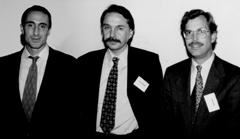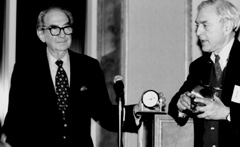 Winners: (l to r) Gary
Taubes, Jon Palfreman, and Ralph King.
Winners: (l to r) Gary
Taubes, Jon Palfreman, and Ralph King.
Ralph T. King, Jr., of The Wall Street Journal, Gary Taubes, contributing correspondent for Science, and Jon Palfreman, senior producer for the weekly PBS television news documentary program, Frontline, were named winners of the 24th annual Science-in-Society Journalism Awards.
Each of the awards--in the newspaper, magazine, and broadcast categories--consists of $1,000 and a certificate. They are the only awards granted and entirely funded by the National Association of Science Writers.
 Winners: (l to r) Gary
Taubes, Jon Palfreman, and Ralph King.
Winners: (l to r) Gary
Taubes, Jon Palfreman, and Ralph King.
King, a Journal reporter based in San Francisco, was cited for the page-one article, "Bitter Pill," which disclosed how a leading manufacturer suppressed publication of a scientific study showing that the company's thyroid drug, used daily by eight million Americans, was no better than far-cheaper rivals. The story ran on April 25, 1996. The judges lauded King for "the investigative enterprise and resourcefulness he demonstrated in developing his powerful, hard-hitting, authoritative account."
Taubes won for "Epidemiology Faces Its Limits," an exploration of the uncertainty and confusion often inherent in population studies that seek to identify causes of noninfectious disease. The article appeared in the July 24, 1995 issue of Science magazine. The judges commended Taubes for his "lucid, well-informed and well-balanced exposition of a daunting and complex topic that is of profound public consequence."
Palfreman was named winner in the broadcast category as writer, producer, and director of "Breast Implants on Trial," the 90-minute Frontline presentation that aired on the PBS television network on February 27, 1996. The program, the judges said, provided an "exceptionally clear-eyed, well-documented, fair and splendidly rendered examination of the highly emotional controversy surrounding silicone breast implants."
The awards were presented October 29 in Baltimore, Maryland at the annual banquet of the Council for the Advancement of Science Writing, held in conjunction with he Council's annual New Horizons in Science Briefing for Journalists, hosted this year by Johns Hopkins University.
A total of 120 entries were submitted for the 1996 competition. These were screened by the NASW Science-in-Society Committee, chaired by Ben Patrusky, executive director of CASW. Other members were Jerry Bishop, science reporter and deputy science editor, Wall Street Journal; Arthur Fisher, science editor emeritus, Popular Science; Fred Jerome of the Media Resource Service; and Paul Raeburn, senior editor/science and technology, Business Week.
The final judges were Philip M. Boffey, deputy editorial page editor, New York Times; Matt Clark, former medicine editor of Newsweek; and Dennis Flanagan, former editor of Scientific American.

"The Sunshine Boys." That's how Earl Ubell, right, described himself and Victor Cohn, when the two were presented mahogany-based desk clocks by the Council for the Advancement of Science Writing at the 1996 CASW New Horizons seminar in Baltimore. The clocks were engraved "Founder, CASW," to honor the two individuals who invented the organization in 1959.